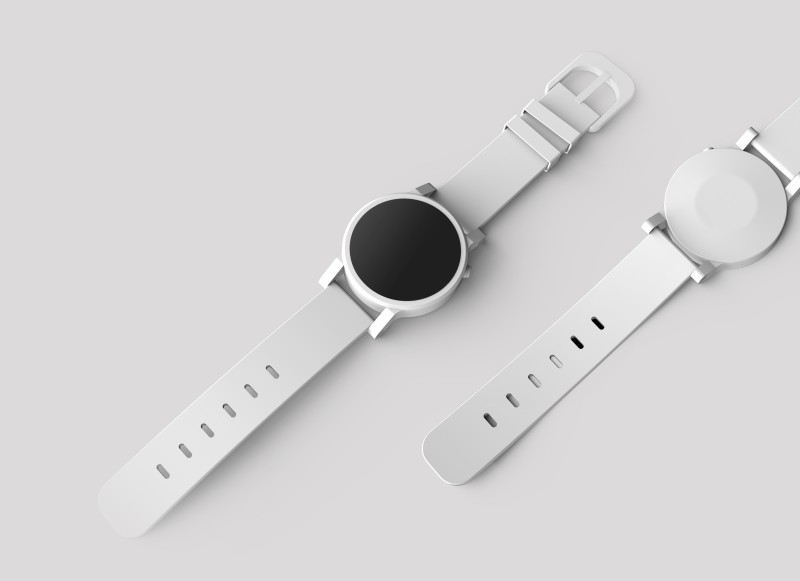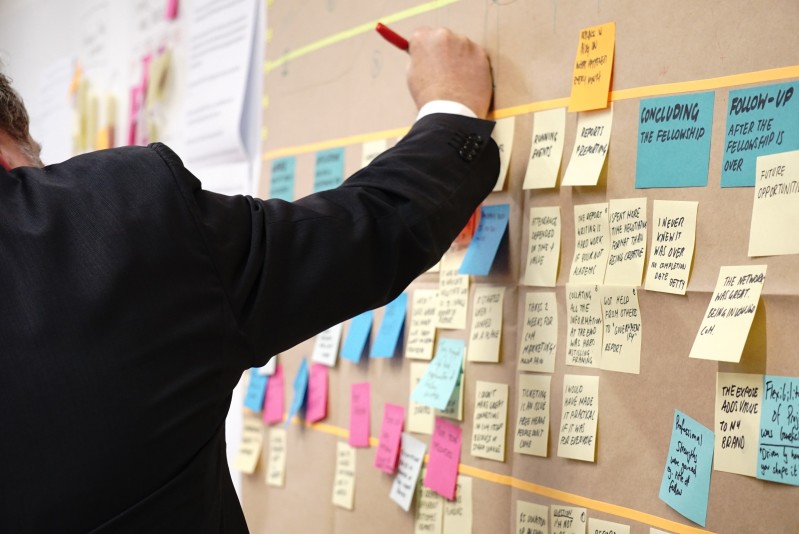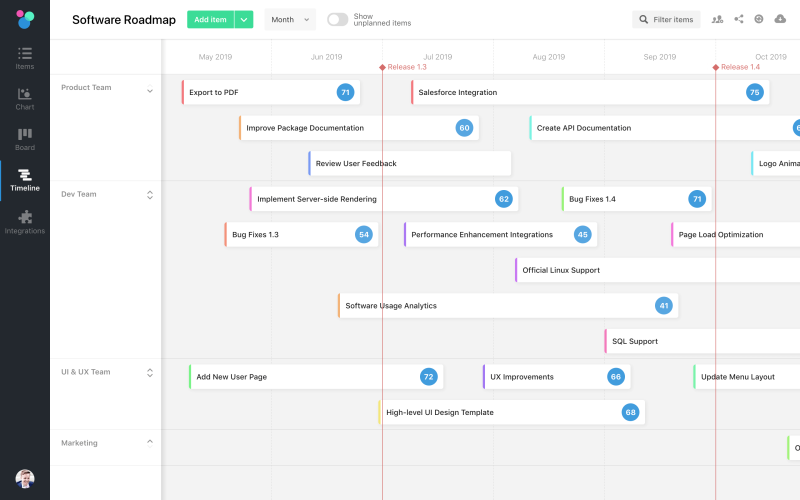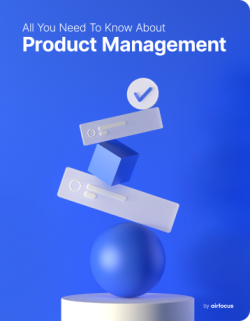Product Manager vs Project Manager. Key Differences Between the Two Jobs

Product managers and project managers are two titles that are often confused and used interchangeably.
Many people, when working directly or indirectly with the product team, find themselves asking; where does a project manager role end and a product manager begin? Do their roles overlap? Are they the same?
The truth is, product managers and project managers are two very distinct roles, with unique responsibilities and expectations to meet.
But that’s not to say their paths never cross! In fact, product managers and project managers do and should work together.

So to help debunk the myths and clear up any uncertainty, this article will explore:
The difference between 'products' and ‘projects'
How this translates to differences between product managers and project managers
The similarities between product managers and project managers
The responsibilities and functions of product managers and project managers
Let’s dive in.
To Start With, Let’s Define The Difference Between 'Products' And 'Projects'
To help us unpick the differences between the roles, we first need to dive into the difference between a product and a project.
It might sound obvious, but you’d be surprised just how often stakeholders confuse them, and therefore the roles that go with them.
Products
A product is, quite simply, something that has been created to solve a problem, satisfy a want, or meet a need.
This could be a physical item (like an iPhone), an abstract item (like an event or an idea), a piece of software, or a service (like a good haircut or fitness class).
In turn, a product achieves a tangible benefit for those that created it — such as generating revenue, acquiring new customers, or achieving another business goal. Importantly, products are long-term efforts with continuous refinement and enhancement.

Projects
A project, on the other hand, is a set of work that is carefully planned to achieve a specific outcome.

Whether the project is small or highly complex, lasts only a few days, or stretches on for a year, it is defined as a set of inputs and outputs which will lead to a particular goal.
Projects also have deadlines and time limitations. This means that, unlike a product, projects are clearly defined and limited in their scope. They are finite.
So What Does It Mean To ‘Manage’ A Product Versus Managing A Project?
Once you’re clear on the differences between products and projects, it starts to become more evident that each requires a different process.
What is product management?
Product management is an organizational function within a company, responsible for prioritizing, planning, forecasting, and co-coordinating the development of a product (and related features) throughout its life cycle.
Generally speaking, product management sits in the middle of all the competing demands, processes, and stakeholders that need to align for a product to succeed.
What is project management?
Simply put: project management is the art of getting things done on time and within budget.
It’s the process of planning and executing the day-to-day tasks needed to translate strategic plans into actionable tasks and deadlines that all lead to one single project goal.
A key aspect of the project management process is ‘time.’ Final deliverables are typically required to be delivered within a specified time span, as opposed to product management which will continue over the whole product life cycle.
Product Managers vs. Project Managers: What Do They Both Do?
True, the lines can sometimes be blurred between the product manager and project manager roles — especially if you’re in a small team or startup, where everyone gets stuck with everything.

That being said, there are differences in the day-to-day responsibilities and key functions between the two.
What Does A Product Manager Do?
A great product manager takes responsibility for a product across its lifecycle, working hard to make sure it’s a continuous success.

They decide what feature to build next, how to prioritize, and help to coordinate research, design, testing, and strategy.
Many people define a product manager as a 'mini-CEO.' but that isn't quite right.
Rather, product managers are the gatekeepers to the vision of a product based on user insights.
Their role is to communicate and diffuse that vision through every aspect of the development team.
As Adam Nash, CEO of Wealthfront, sums it up:
"[Product managers] figure out what game a company is playing, and how it keeps score."
The best product management practitioners do this by developing multidisciplinary skills across both technical and soft competencies, enabling them to not only communicate effectively with all stakeholders but also build well-rounded products that people love.
Right, So What Are The Key Responsibilities Of A Product Manager?
A product manager must define and communicate the product vision:
Great product managers set a clear and inspiring product vision. This describes the motivation for creating the product and aligns everyone involved to make the product a success.
As such, product managers must also communicate this vision to stakeholders to gain support and motivate teams.

A breakdown in communication, or one team working on one goal and another on something different, can cause chaos. Miss-aligned teams, objectives, and resources can easily result in product development setbacks, unhappy senior managers or engineers, and ultimately, customers that don't get the experience they need.
A product manager needs to represent the user:
Customers buy products that address their problems, needs, or wants. That’s why it’s crucial that product managers champion the user at every stage of the product lifecycle.
A successful product team will be focused and passionate about creating products that have real world value. But achieving product-market fit is an ongoing process and something a product manager should be invested in and spend time working on.
A product manager will lead research and ideation:

Research is a critical part of a PM’s role. This informs the product vision and helps set the strategy. It also helps with the process of ideation.
An effective Product Manager collects ideas from across the business and from customers themselves, such as feature requests and feedback, then decides which will help achieve the product goals.
Of course, a lot of what research throws up won't achieve relevant goals and can be declined with a polite 'no.' But promising ideas deserved to be explored. The PM must add these into the product planning and regularly communicate progress back to stakeholders (such as customers or team members).
A product manager creates actionable roadmaps:
Alignment is one of the most important considerations for a product manager, which is where a detailed roadmap really comes into its own.

A great product roadmap will communicate product strategy, prioritize work, gain consensus about product decisions, clearly mark milestones, and so much more. Ultimately, this helps to make sure that work is focused on cross-organizational goals. This applies to any team and helps crystalize their priorities, no matter their function.
A product manager needs to handle release planning:
There’s a lot to manage in the lead-up to release or launch. At this time, a product manager must define a release or launch process and coordinate the activities required to bring a product to market.
This means collaborating between departments and coordinating marketing, sales, and customer support. Product managers will also need to carefully manage dependencies between releases to make sure it all flows smoothly.
Can You Break That Down Into A Typical Day In The Life Of A Product Manager?
Sure we can!

Product managers typically find themselves coordinating a lot of meetings on any given day. As an example, let's take a walk through the typical day of a PM at a software company:
09:00 AM - Check ticketing systems for any outstanding product issues
10:00 AM - Call with a legal team to discuss risks and approval for a new feature
11:30 AM - Test a new feature with customers
1:30 PM - Standup with developers and designers to discuss updates from the past week
3:30 PM - Create a Product Requirements Document (a clearly defined specification document) for a new feature
4:00 PM - Review prototypes from engineers
4:30 PM - Discuss feature requests from stakeholders and/or hold a prioritization meeting
How Much Can A Product Manager Expect To Earn?
Product managers are among the 10 best-paid jobs in America (according to Glassdoor), up there with airline pilots and geophysicists.
To give a rough figure, a product manager’s salary could range from $61,000 to $200,000+ throughout their career, though, the money you take home will also depend on the industry and your level of experience.
In your first decade of work as a product manager, you have a few titles available to you:
With no experience, you could be an Associate Product Manager. Typical salaries ranges from $58,000 to $117,000. This often requires a college degree and around two years of work experience. As an entry-level role, many large companies have started to recruit from colleges and universities.
After three to five years as an Associate Product Manager or similar role, you'll have enough experience to be considered for a Product Manager role, with a salary range of $78,000 – $154,000.
After between five to eight years of product management experience, you'll be considered senior and eligible for a salary of between $97,000 – $185,000. Your responsibilities might also widen to include managing multiple products or a product portfolio.
Once you reach ten years plus as a Product Manager, your options really open up:
As a 'Director of Product Management,' you'll earn between $123,000 – $213,000 and take responsibility for some personnel management.
As a 'VP of Product Management,' you'll own the product vision for a whole company and lead a Product Manager team. The salary can vary widely, as startups prefer to offer equity, but it typically ranges from $130,000 – $254,000.
Although a new role, the executive-level Chief Product Officer position is becoming more common. The median salary for a CPO is $187,000, although total compensation packages can reach as high as $600,000+ with bonuses and stock options.
Okay, So That’s Product Management Covered. Now, What does a Project Manager Do?
The Project Management Institute says that a project manager is a "change agent." This is someone who “makes project goals their own and uses their skills and expertise to inspire a sense of shared purpose within the project team.”
In simpler terms, project managers are leaders within their organizations, helping teams to deliver individual projects within the deadline and budget available. Essentially, project managers are responsible for the planning, design, execution, monitoring, control, and completion of a project.
A great project manager can think strategically whilst not neglecting the small but important details required to complete the project. This ability is used to break down large strategic plans into smaller task-orientated projects.
Although project management is generally a more practical role, excellent project managers use various soft skills to ensure projects are completed. They will need leadership and motivation skills to inspire teams to work effectively, communication skills to motivate stakeholders, and adaptability to cope with difficult situations or internal conflicts.
Right, That Makes Sense. So What Are The Core Responsibilities of a Project Manager?
As you can gauge from the list above, project management requires a high level of stakeholder management and organization. Project managers will generally be handling several competing demands, which, broadly speaking, we can break down into the following areas:
A project manager leads in planning project timelines:
One of the key responsibilities of a project manager is to create a realistic plan to meet the project's objectives while sticking to a budget and timeline. This plan will define the scope of the project and the time and financial resources required to complete it. To do this, product managers use tools like airfocus and the project roadmap template to keep track.
A project manager needs to be a good leader:
Through project managers don’t tend to have people management responsibilities, that doesn’t mean that leadership isn’t a key part of their role.

A strong project manager will be continuously focused on motivating their team by keeping everyone aligned on a common goal. Through assigning tasks, setting deadlines, providing resources, and regularly communicating with stakeholders with project updates, the project manager will have lots of practical leadership functions, too.
A project manager needs excellent time management skills to keep the project running on course:
Ultimately, project managers must ensure that a project stays on track. Therefore, time management is one of the most important responsibilities of a project manager. If delays occur, a project manager must resolve them and speak with stakeholders.
Excellent project managers are experts in managing risks and enable the project to continue moving forward, even if delays occur.
What Does A Day In The Life Of A Project Manager Look Like?
As a project manager, no two days are the same. As their responsibility is to keep the project moving forward, each day will vary based upon tasks set, problems encountered, and the demands of stakeholders.
But as an example, let's consider a project manager at a software company:
09:00 AM - Daily standup (these meetings are held with key stakeholders to get an update on task progress and any blockers)
11:30 AM - Hold progress meeting with key partners to ensure resources are available for the next stage of the project
1:30 PM - Present and get approval for an upcoming deployment to minimize disruption for users
3:30 PM - Meet with senior management to update them on the project and escalate any issues as required
4:00 PM - Catch up on project admin, including filing invoices, raising purchase orders, and updating timesheets
4:30 PM - Track completion of tasks and update project tracking software
What Is A Standard Project Manager Salary Range?
Project managers have complicated roles and are paid well to reflect the job's difficulty, the industry they are in, the level of education, and their experience.
That’s why, through a project management career, your salary could range from $55,000 to $110,000+.
If you’re just starting and have less than a decade of project management experience, your career path could look like this:
You'll start as a Project Coordinator on $55,000+, assisting Project Managers with their activities. You'll monitor project plans, schedules, and more, helping to ensure project deadlines are met. This often requires a college degree and around two years of work experience. Because this is an entry-level role, you may start your product management trajectory fresh from college or university.
After three to five years, you'll move up to being a Project Manager on $75,000+. This could be an individual role or with responsibility for several Project Coordinators.
After between five to eight years, you could become a Senior Project Manager on $86,000+ or a Project Director on $95,000. This could include responsibilities for several Project Managers or very large individual projects.
With over a decade of experience, project management veterans tend to move towards executive positions, with salaries exceeding $120,000.
So, Do The Roles Of Product Management and Project Management Overlap?
The truth is, both roles tend to work very work closely together to achieve the organization's strategic goals, which means that overlaps do occur. In fact, in some very small organizations and startups, the responsibilities might sometimes even be completed by the same individual.
Key areas where these overlaps tend to happen are:
Both roles need to shift between the big-picture strategy and the low-level tactics to ship successful products and projects
Both roles need similar skills, such as stellar organization, complex problem solving, and a range of soft skills (e.g. listening, communication, and motivating)
Both roles tend to interact with the same stakeholders to report progress and request resources. Alignment between product managers and project managers is key in these situations.
Okay, So Are They The Same Or Not?
On paper, these two roles have very clearly defined — and separate — areas of responsibility. That said, in the chaotic world of real organizations, overlaps can and do occur on a daily basis.
At the end of the day, the critical thing is not how distinct these roles are but how well they work together. After all, it is only through the successful collaboration of both product and project managers that exceptional products are made.
Valentin Firak

Read also





Experience the new way of doing product management

Experience the new way of doing product management



